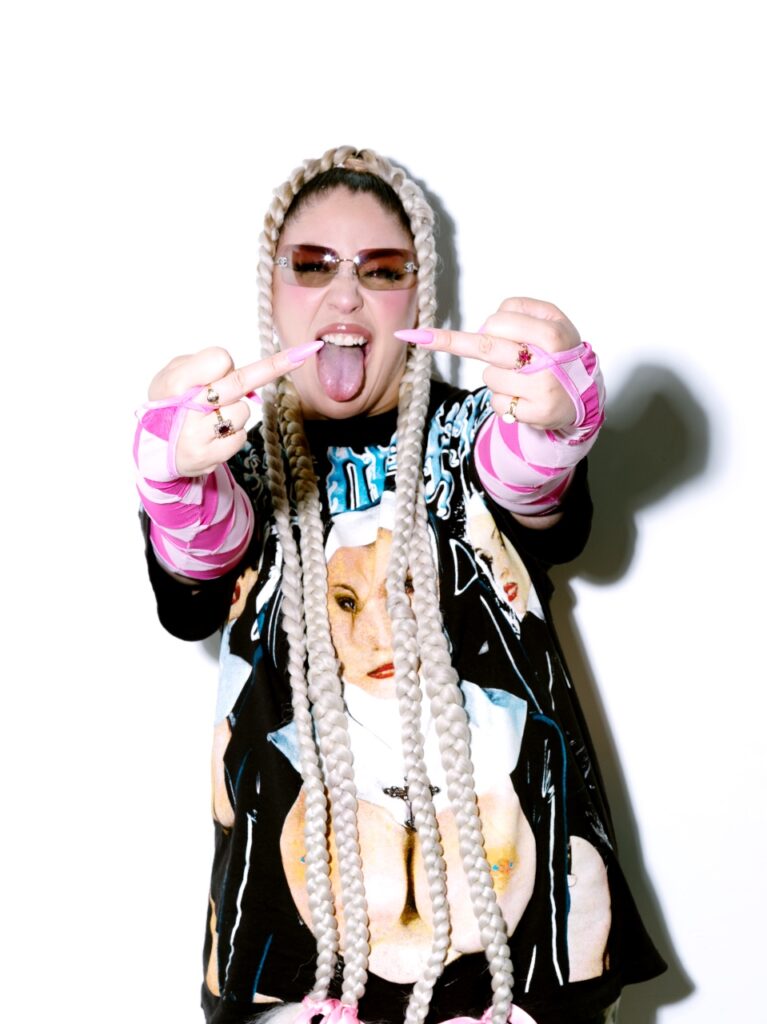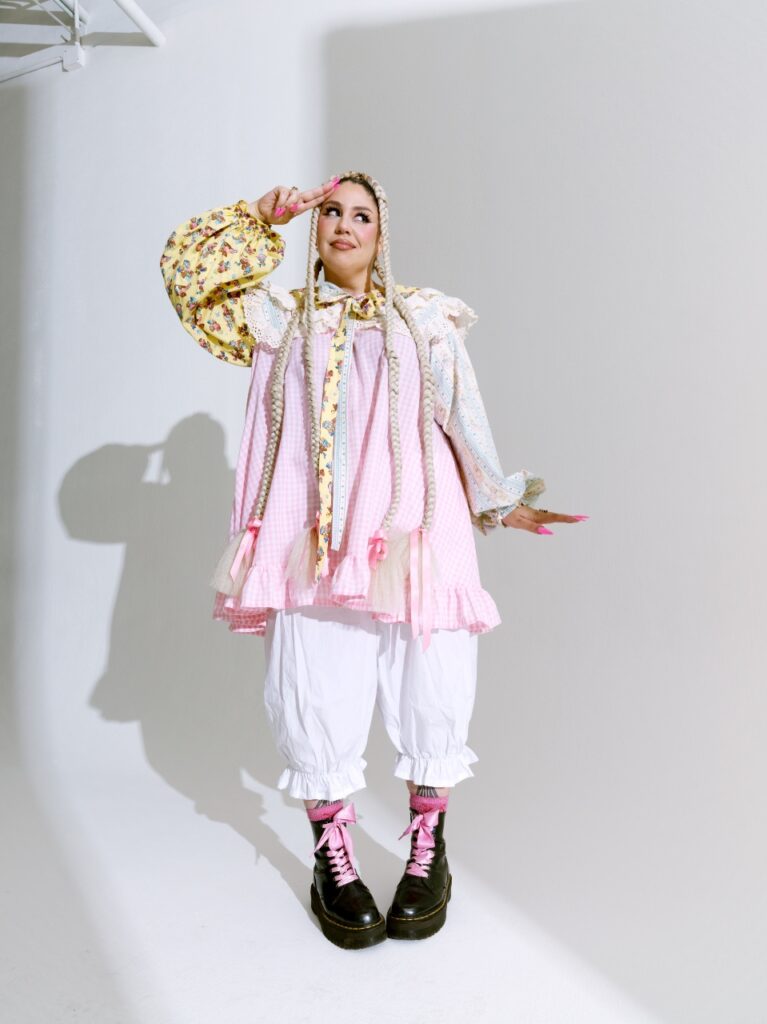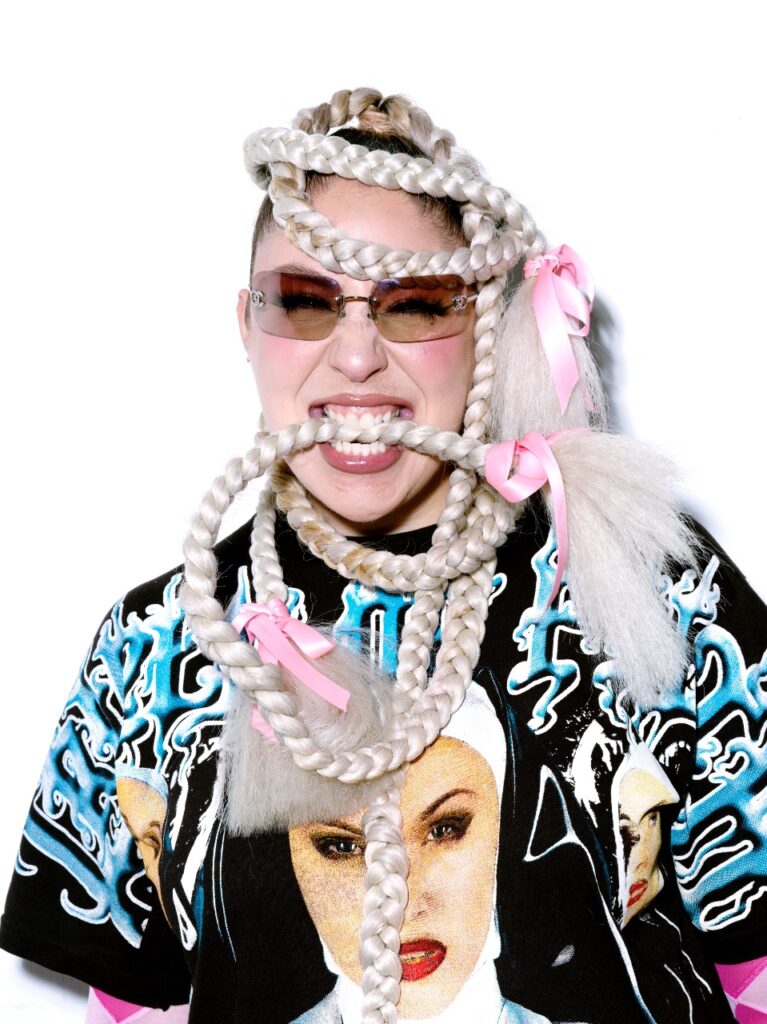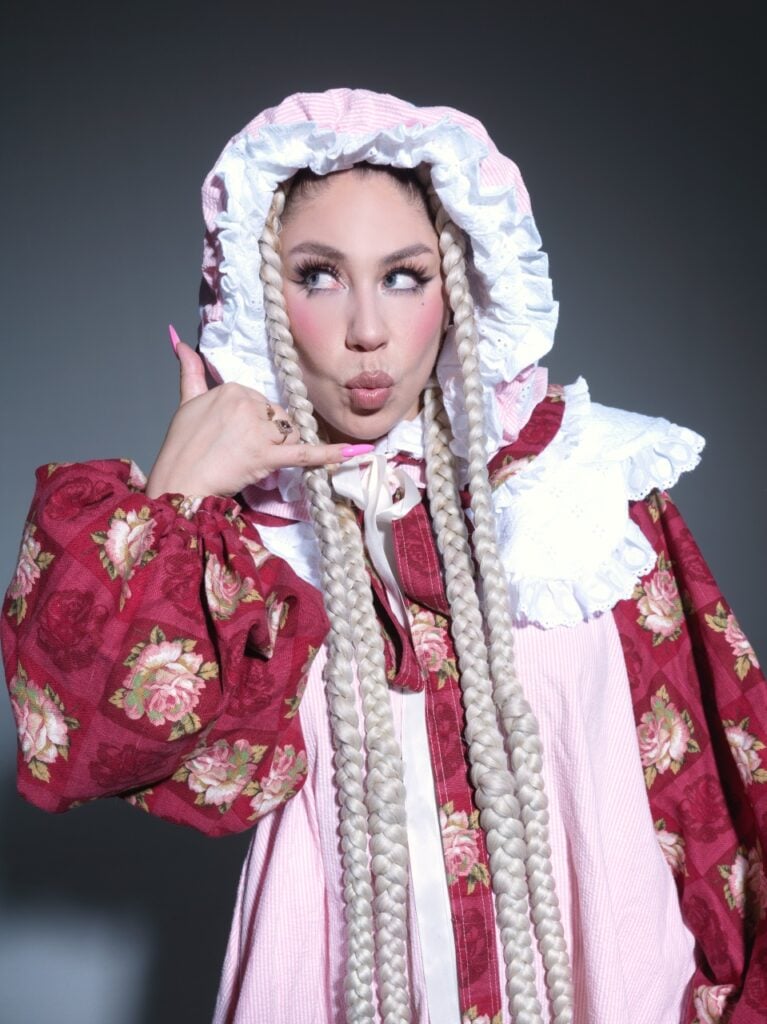Frances Carter
The Wonderful Double Life of Theia
Aotearoa’s queer pop icon talks about living in LA, her alter ego TE KAAHU, and being a brave voice for the unheard
It’s October 2022, and you find yourself at Auckland’s The Others Way Festival, inside Pitt Street Church. Outside, the K’ Road precinct thrums with excitable noise, people rushing to and from venues and sets, but you, who are unfamiliar with most of the acts on the bill, take a chance on seeing someone perform in a quiet space.
Inside here, there is only solemnity, as an artist called TE KAAHU tentatively sets up on stage — her altar for the evening. The air around you is emotionally charged, and the people packed tightly together in the aisles around you sit motionless, not in prayer but expectation.
TE KAAHU now has her eyes closed, pausing for a moment of inner reflection, before she looks out towards the masses in front of her, opens her mouth and begins.
For the next 30 minutes, you watch and listen carefully, transfixed now like those around you, as this artist you hadn’t known existed until today (your internal monologue is blasting you for this oversight as all of this happens) performs some of the most moving waiata you’ve ever heard live.
Later that night, as you return to the throngs of music worshippers overwhelming K’ Road, you tell anyone who will listen about TE KAAHU and the church setting and the spiritual waiata.
And then you get home, filled with resolve to discover all of TE KAAHU’s music, when you learn something salient: this artist you saw perform a few hours ago, who gave you one of the best live music experiences you’ve had in years, well, that wasn’t even her main music project. It’s at this moment you discover Theia, and her wonderful double life.
And what a duality it is, because Theia and TE KAAHU couldn’t be more different.
Love Music?
Get your daily dose of everything happening in Australian/New Zealand music and globally.
When Theia is Theia, she is stylish and self-confident, an artist in the mould of Peaches and a contemporary of Charli XCX, who releases unapologetically queer and feminist anthems.
As TE KAAHU, she’s more meditative, devotedly exploring Māori language and culture (Theia is Waikato-Tainui, Ngaati Tiipaa). One learns from the past; the other finds joy in the future. One makes gentle folk; the other makes enticing, brash alt-pop. One is inspired by her tūpuna wāhine (female ancestors); the other is influenced by defining females of pop and rock: Stevie Nicks, Alanis Morissette, Björk, Britney Spears, and, more recently, Sinéad O’Connor and Fiona Apple.
TE KAAHU came after Theia, but the world got a TE KAAHU debut album first, Te Kaahu O Rangi (2021), a collection of nine waiata Rolling Stone AU/NZ praised as highlighting the “transcendent power of music” in a four-star review. Other acclaim soon followed, with Te Kaahu O Rangi earning two nominations, for Best Record and Best New Artist, at the 2023 Rolling Stone Aotearoa Awards.
But now Theia’s debut album, one of the most anticipated albums in Aotearoa music in years, is nearing completion, the Ōtautahi-born artist meticulously preparing it in the US, where she moved to this year. Ever the diligent creator, she’s been writing and reworking and writing again, taking myriad songs in different creative directions, pursuing a record that feels just right for her. The album, she says, will be “very upfront about what it’s like to be a queer, BIPOC person navigating life in 2024. Religious trauma, politics, pain, joy, anger. All of it.”
How Theia has found any time to record her debut album, though, is surprising.
Over the past 18 months, she has performed at Sydney Mardi Gras; Pride events in Los Angeles, Toronto, San Diego and Miami; the Women’s Freedom Festival, again in Los Angeles; and she headlined Sum of Us, one of the world’s leading festivals for LGBTQIA+ women and trans people, last September. A significant honour was also bestowed upon her at West Hollywood Pride, when she was invited (and given a blessing by Tongva elders) to mark the start of the ‘Dyke March’ with a Karanga and Haka.
“When they first asked me to do a Haka, I was a little hesitant,” she admits. “But the organisers of the event explained their reasoning and also sought the blessing of the Tongva elders. On the day, there were quite a few of the elders there and it really felt like such an honour to stand up and mark the start of what is a very historic and iconic event in the LGBTQIA+ community in Los Angeles.”
And that’s just North America. In her home country, she supported Peaches — call it a blessing of one of modern alt-pop’s most exciting artists by one of the genre’s most famous sisters — and appeared at Splore, Homegrown, WOMAD and other New Zealand festivals.
But this year, so far, has been about her adopted home, where she has attracted both fan favour and critical fervour. “Having seen the crowd jumping and punching the air several minutes prior, it was clear that Theia commanded their every move,” wrote The Stranger, Seattle’s leading alternative newspaper. “Theia was the perfect set to close the Madame Lou’s stage — gifting us unmatched energy, compelling culture, and the bravery to be your fucking self.”
“I love it here!” Theia exclaims. “I’ve travelled more this year than I’ve ever travelled, [and] it’s all been for music. I just feel so lucky that I get to do this. Right now I’m sitting in my hotel room in Toronto, where I just did a set at Toronto Pride, on the same lineup as Tommy Genesis!” She cites Los Angeles as being a “hugely inspiring and motivational” base, but plans to return to New Zealand for a few weeks in the near future.
What does she miss about Aotearoa? “Whānau. Friends. Food. My culture. My marae.”
For the literal student of Indigenous life who double majored in Te Reo Rangatira and Māori and Indigenous Studies at university, who had to endure the scoffs of Pākehā telling her that such a degree “was a waste of time” and that she should study “something that would be useful outside of New Zealand,” the sincere interest US audiences have shown in learning more about Māori culture and Aotearoa after seeing her perform live has been life-affirming.
“I have experienced only warmth and a true desire to know more about our language and culture in the US. I’ve found the same in Canada too. Last summer I took TE KAAHU to Folk on the Rocks in Yellowknife and the Calgary Folk Festival and again, the response was so beautiful.”
All this activity has limited her studio time, but Theia isn’t too bothered; she’s having so much fun performing her unbridled queer songs live, connecting with audiences who are, in many ways, different to her but also very similar. Young BIPOC women of colour over there are seeing and streaming Theia in big numbers, so much so that the US now ranks as her biggest country on Spotify. For the young girl growing up in a conservative whānau in Christchurch, her current life would have seemed like an unattainable dream, but this is her reality now.
Theia straddles her two worlds with ease, but she was careful to keep them separate for a long time, wishing to allow both projects space to breathe and be treated with distinction in their own right.
In 2023 they finally intersected — not so much an intersection as an intentional collision — on the Girl In a Savage World tour, which saw her perform both Theia and TE KAAHU songs at arts festivals around Aotearoa.
It was actually the Girl In a Savage World tour which precipitated the creative shift in Theia’s debut album. “The concept was to strip the music of all the bells and whistles (in the case of the Theia songs, it was taking away all the big, bold electronic production and playing them fully live) and to accentuate the lyricism and meaning in my songs — in both English and te reo Māori. The response was really affirming and gave me the confidence to throw out the rule book.”
Theia named the tour after a lyric from her 2023 single “Pray 4 Me”, a beautifully observed ballad that could easily have belonged on Te Kaahu O Rangi. “Don’t pray for me or put me under ur spell / I’m just a girl living in a savage world / Living in a savage world”, she sighs, alluding to the strict religious background she battled as a child.
Listen to her sing that line and listen closely: the world-weary emotion in her voice contains all of the complexity that comes with working through trauma, acting out of compassion rather than vindictiveness, and recovering on your own terms. (The lyric is also reminiscent of Tusiata Avia’s 2021 book, The Savage Coloniser, which audaciously dissected the histories of violence in colonised worlds.)
“Anyone who has listened to some of my more recent Theia music, where I touch on growing up in a conservative Christian family, [will] know that I’m still processing and dealing with religious trauma from my youth. It’s probably easy to associate this with the city in which I grew up and experienced this trauma.”
But again, she chooses to practise compassion, viewing Christchurch with warmth. “I do my best to try and not allow this to taint how I feel about it now. It’s where a lot of my family still are and aside from deep connection to my marae, Tauranganui and hapū, Ngaati Tiipaa in my haukāinga of Te Pūaha O Waikato, it’s where I still call home.”
The Girl In a Savage World tour was part of Theia’s Year of Fun in 2023, following her important but innately serious transition into honouring her whakapapa as TE KAAHU in 2021 and 2022.
After releasing “Pray 4 Me”, with its sonic vestiges of TE KAAHU, she gleefully dived into the deep end of alt-pop again, dropping the sizzling triple hit of “Crucified By U” (released just a few days after she joined Peaches onstage at the Powerstation in Auckland), “Girls!”, and “Dollhouse”.
The girls and the gays were obsessed with Kylie’s “Padam Padam” last year, but “Girls!” was a proper Pride anthem, and perhaps Theia’s most sensationally queer release to date.
“She smells like heaven / So divine / I think I want to take a bite”, she gushes about a secret crush. “Call me a doctor I think I’m sick / Cos all I want is her lips”, she adds, and when medical intervention is required for your lust, you know you’re queer as all hell. As if she just couldn’t wait to release a bona fide Pride anthem, Theia adapted her recording process for “Girls!”. “For the first time ever on a Theia track, I did away with all the electronic bells and whistles and went only with live production. Everything you hear — the drums, the guitars — are all being played live in the studio.”
Recording songs live was an invigorating experience, reminding Theia what she loves about making music. “Playing live, as much as I have in these last few years, has helped me to forget about numbers and algorithms and to focus on doing what I love doing and that’s writing songs that are deeply personal to me.”
“Girls!” makes for a wonderful companion piece to the TE KAAHU waiata “E Hine Ē”, in which she sings, “E hine ē / Tō rerehua nei / Ō makawe me he awa tere / Tangi ana koe / Haumārotoroto ki ō pāpāringa / Māku e tiaki” (“Ladies / Your beauty / Your hair is like a fast river / You are crying / Freshness on your cheeks / I will take care of it”), the twin songs expressing her sexuality in both tenderness and horniness, as one should.
“Dollhouse”, meanwhile, nukes the idea of the ‘ideal’ nuclear family. “[‘Dollhouse’] is about breaking free of the restraints and pushing back against the expectation put on girls to be perfect and pure,” she says.
There’s no release date for Theia’s debut album yet, but she promises it is coming.
In the meantime, this year will see her release three new TE KAAHU waiata, a triptych whose undercurrent theme is “Love for your ancestors, your whakapapa, those around you.” They will be accompanied by three spoken word pieces, with Theia reciting the lyrics in both te reo Māori and English, a concept born on her Girl In a Savage World tour, where audiences appreciated hearing the Māori versions accompanied by the English sentiment.
She will also drop her most vehemently political song yet. “BALDH3AD!”, an emphatic protest anthem, has been embraced by audiences watching Theia’s recent live sets, and she’s now ready to officially unleash it on the world.
The song takes its title from Bob Marley and the Rastafarian movement — “baldhead” was used to reference non-Rasta people — and the term was widely taken up by Māori and used in a similar way for Pākehā. But where Marley and The Wailers went for the delightfully literate, singing “Chase those crazy baldheads out of our town” on their 1976 song “Crazy Baldheads”, Theia’s “BALDH3AD!” is more thoughtfully poetical.
“I cannot breathe, please step off of my chest, loosen the noose tightening round my neck, I wish for freedom and to sing my song, we’re prisoners on the very land we’re from,” she sings tenderly; defiant, not defeated. “Plunder my motherland, pollute the sea, but still I survive, though you clip my wings, Baldhead, you tricked us with your treaty” she cries, before concluding with Rewi Maniapoto’s famous proclamation, “Ka whawhai tonu mātou, Ake Ake Ake!” (“We will fight on forever, and ever and ever.”)
“That’s how I feel,” she says of Maniapoto’s impassioned words in response to colonial force’s invasion at Ōrākei calling on Māori to surrender, “and I know it’s how many young Māori feel.” But she’s quick to add that she views “BALDH3AD!” as a protest song not just for Māori, but for “all Indigenous peoples of the world.”
She remembers, for example, the touching response the song received during her recent Belltown Bloom performance in Seattle. “The crowd literally went from going nuts in the mosh pit to all sitting on the ground in hushed silence. To go from a really turnt guitar-based live set to then having the audience voluntarily sitting on the floor in silence and feeling the wairua from the crowd when I sang ‘BALDH3AD!’ is not something I’ll forget.”
Theia is delivering this waiata when her country needs it most.
Gone are the safe haven years of Jacinda Ardern’s ministerial reign, with her replacement, Christopher Luxon (a “baldhead”, literally and philosophically) leading the most conservative government in Theia’s lifetime. Accused of being an “enemy of Māori”, Luxon has sought to make major changes reversing years and years of progress towards celebrating Māori language and culture.
Luxon’s roll call of heinous acts includes calling designated Auckland University areas for Māori and Pasifika students “highly disappointing”, declining to attend a special national hui put on by Kiingi Tuheitia in an attempt to “unify the nation and hold the government to account”, and insisting there was “a problem” with the amount of te reo Māori used in government departments. Compare and contrast these behaviours with Ardern’s lauded leadership in the aftermath of the Christchurch mosque attacks in 2019.
It isn’t presumptuous to find meaning in the timing of Theia unveiling her TE KAAHU project, so deeply personal and focused on whānau and progress and the past as it was, during Ardern’s time in office, when Aotearoa felt like a much better place to release an all-te reo Māori album. But now? Now is not the time for inner reflection; now is the time to fight with raised voices and righteous anger. “Ka whawhai tonu mātou, Ake Ake Ake!” is to Māori what “Our revenge will be the laughter of our children” is to the Irish and what “From the river to the sea” is currently to protestors around the world; if marginalised people continue to make their voices heard while facing dehumanisation, that’s a significant act.
“I’m shell-shocked at the colonial violence this new government has caused,” Theia says with force. “The wounds of intergenerational trauma we have actively been trying to heal torn open, and this system threatening decades of indigenous progress in tino rangatiratanga. It makes me furious.”
Theia and TE KAAHU couldn’t be more different, but they are united by one key similarity: an unceasing commitment to authenticity.
A Theia song rallies against social injustices in a gleaming pop package while a TE KAAHU waiata traces whakapapa and searches the soul in hushed tones, but both show the multitudes of their creator. She is queer and that should be celebrated, she says; she is Māori and that should be honoured, she says.
“Even though both projects have very different sounds, and obviously they’re in different languages, it’s still me at the heart of both. You can’t disconnect the two.”
In searching for authenticity wherever her artistry goes, she offers herself generously to her listeners. No stone is left unturned in her desire to share everything with her fans. And Theia being her authentic self in both projects is also, by its very nature, a political act, the child of a conservative whanau not hiding her sexuality, the Indigenous woman advocating for her identity as her country slips back into archaic modes.
Because Theia will never stop being a voice for the unheard, a vessel for marginalised protests. Theia’s debut album has been a long time coming, but she’s really only at the beginning of her authentic artistic journey.
The girl is in a savage world, but she’s fucking thriving.
This Theia interview features in the September-November 2024 issue of Rolling Stone AU/NZ. If you’re eager to get your hands on it, then now is the time to sign up for a subscription.
Whether you’re a fan of music, you’re a supporter of the local music scene, or you enjoy the thrill of print and long form journalism, then Rolling Stone Australia is exactly what you need. Click the link below for more information regarding a magazine subscription.







































